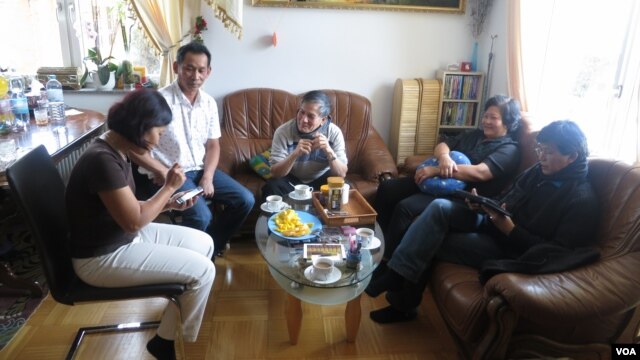27 March 2013
VIENNA, AUSTRIA - In Austria, Cambodians who were forced to flee their
country still find ways to maintain their identity, though some here
say that can be difficult.
In this European country, Cambodians keep up with their Buddhist practices, teach traditional dance and maintain Khmer language classes for children born here. Cambodians here say they can sometimes face discrimination, or confusion that they are either from Thailand or have immigrated for jobs, and not because of the war.
Some 2,000 Cambodians live in Austria. Some came in the aftermath of the Khmer Rouge, while others migrated after studying in the former Czech Republic. Still others came later.
Kao Savuth, former president of the Khmer Austrian Community, who moved here in the 1980s, said he formed the association to help Cambodians keep their practices and celebrate their own traditions.
“We didn’t let foreigners think that we migrated here because we didn’t have anything to eat,” he said. “But because we had war.”
For the Khmer New Year, Cambodians living in Austria gather in a town called Linz, where most of the community lives, about 200 kilometers from Vienna. Traditional and popular dance are included among sporting events and shared meals.
Young children here are taught the traditions for months in advance, said Oum Phalla, a dance instructor.
“I want them to know about our pure, longstanding culture, especially small children for remembrance in the future,” Oum Phalla said. “Especially we want Austrians to honor our culture. At every Khmer New Year, not only Khmer people attend, but many local Austrian people also.”
There is a pride among Cambodians in Austria, said Kao Savuth, even among the young, who may not speak Khmer.
Prum Vanna, who came here after studying in Czechoslovakia and has lived in Austria for 30 years, said his daughter, though born in Austria, considers herself Khmer. She speaks Khmer, sings traditional songs and wants to learn to write the language, he said. But much of that came through his own work.
“If parents do not speak Khmer to their children, their children cannot speak Khmer,” Prum Vanna said. “If parents want their children to know and love Khmer, they need to be a little strict, because sometimes their children won’t want to practice.”
There are some children who don’t always think of themselves as Khmer, said Chan Serey, a resident here. “We seem to be separated from other Khmer people, as there are too few Khmer here in Vienna. So children might follow us only in childhood, but when they grow up, they think of themselves as European instead.”
In this European country, Cambodians keep up with their Buddhist practices, teach traditional dance and maintain Khmer language classes for children born here. Cambodians here say they can sometimes face discrimination, or confusion that they are either from Thailand or have immigrated for jobs, and not because of the war.
Some 2,000 Cambodians live in Austria. Some came in the aftermath of the Khmer Rouge, while others migrated after studying in the former Czech Republic. Still others came later.
Kao Savuth, former president of the Khmer Austrian Community, who moved here in the 1980s, said he formed the association to help Cambodians keep their practices and celebrate their own traditions.
“We didn’t let foreigners think that we migrated here because we didn’t have anything to eat,” he said. “But because we had war.”
For the Khmer New Year, Cambodians living in Austria gather in a town called Linz, where most of the community lives, about 200 kilometers from Vienna. Traditional and popular dance are included among sporting events and shared meals.
Young children here are taught the traditions for months in advance, said Oum Phalla, a dance instructor.
“I want them to know about our pure, longstanding culture, especially small children for remembrance in the future,” Oum Phalla said. “Especially we want Austrians to honor our culture. At every Khmer New Year, not only Khmer people attend, but many local Austrian people also.”
There is a pride among Cambodians in Austria, said Kao Savuth, even among the young, who may not speak Khmer.
Prum Vanna, who came here after studying in Czechoslovakia and has lived in Austria for 30 years, said his daughter, though born in Austria, considers herself Khmer. She speaks Khmer, sings traditional songs and wants to learn to write the language, he said. But much of that came through his own work.
“If parents do not speak Khmer to their children, their children cannot speak Khmer,” Prum Vanna said. “If parents want their children to know and love Khmer, they need to be a little strict, because sometimes their children won’t want to practice.”
There are some children who don’t always think of themselves as Khmer, said Chan Serey, a resident here. “We seem to be separated from other Khmer people, as there are too few Khmer here in Vienna. So children might follow us only in childhood, but when they grow up, they think of themselves as European instead.”


No comments:
Post a Comment